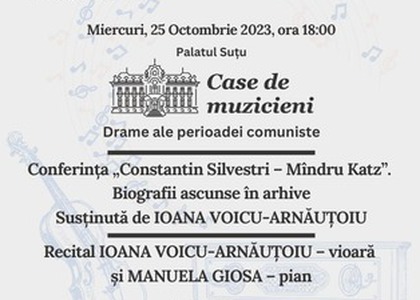> [Archived] Events

Reportage from the recital-conference titled Houses of musicians. Dramas of the Communist Era
On the evening of Wednesday, 25th of October, the Suțu Palace in Bucharest witnessed the first conference accompanied by a recital, which is part of the project titled Houses of musicians. Dramas of the Communist Era, an ongoing initiative organized by the Opus association. In the first part of the evening, the audience enjoyed a recital of Romanian music performed by violinist Ioana Voicu-Arnăuțoiu, accompanied by pianist Manuela Giosa. The program included Pascal Bentoiu's Sonata op. 14 and Constantin Silvestri's Sonata op. 19 no. 1, scores rarely encountered, although considered emblematic for the modern Romanian chamber repertoire. Immersed in the spirit of Silvestri and Bentoiu's music, the Suțu Palace seemed to transport those present back in time, to an era when the building hosted unforgettable balls and social events.
The lecture in the second part of the evening was titled Constantin Silvestri - Mindru Katz. Biographies hidden in the archives, held by Ioana Raluca Voicu-Arnăuțoiu, researcher in the N.C.S.S.A (National Council for Studying the Securitate Archives) archives, and daughter of the anti-communist fighter Toma Arnăuțoiu. The audience experienced the dramatic realities of communist Romania during the '50s and '60s, a period marked by repression of the political, artistic and intellectual elite of the pre-1947 era. The stories of two brilliant musicians, conductor Constantin Silvestri and pianist Mindru Katz, were brought back to life, shedding light on the constraints and abuses they faced at the hands of the communist Securitate.
We've uncovered the following about Mindru Katz's recruitment attempt:
Ioana Voicu-Arnăuțoiu: The leadership of the Second Directorate of Securitate responsible for its elaboration [of a new strategy to prevent the pianist from permanently leaving the country], developed a plan, stating, and I quote: "In Romania, Mindru Katz is highly regarded as a valuable artist and can provide essential information about suspicious elements among artists, musicians, composers, theater actors, etc. And considering his frequent travels abroad, he can be of real use to our organization, so we propose recruiting him as an agent."
About how Constantin Silvestri was perceived in Romania and the constraints imposed on him by Securitate:
Ioana Voicu-Arnăuțoiu: For years, because he did not obey the directives set by the propaganda leadership of the Romanian Communist Party, which were received from Moscow,Silvestri was harshly criticized by the so-called music critics. However, Constantin Silvestri, who had the freedom to express himself through the music he conducted, was recognized not only in Romania but also abroad. Silvestri keenly felt the restrictions imposedupon signing contracts with foreignagencies, as well as the difficulties related to obtaining exit visas, mandatory for all Romanianswho wanted to travel abroad.
At the end of the concert, we gathered impressions from both the audience and the protagonists:
Pianist Manuela Giosa: I am thrilled and happy to be with my friend, Ms Ioana Raluca Voicu-Arnăuțoiu. Every time we meet and plan a recital, we enjoy each other's company and the music we put together. Of course, I am impressed - just the way she was also moved to tears - by the research she conducts and by the things she unveils and reveals to us.
Ioana Voicu-Arnăuțoiu: I felt a warm and enthusiastic audience, even though I was talking about events that happened 40 years ago or more, and though my explanations were a bit too technical, since I was reading from various official documents. It seemed to me that there were both young and older people fascinated by what they heard and I was glad to be able to show them the unique pictures from inside the house on 19 Paris Street, where Constantin Silvestri lived.
Vlad Văidean, musicologist: It was a very instructive evening. It is always refreshing, especially for some of us who are younger, to discover details about such personalities who managed to succeed, despite very unfavourable conditions. I am still curious to see how Ms.Arnăuțoiu's research unfolds.
Cristina Chirvasie, director: I am truly delighted to have cometo this special conference about pianist Mindru Katz and Constantin Silvestri, two musicians who brought Romanian music to great heights of glory. The two parts of the conference presented by Ms. Ioana Raluca Voicu-Arnăuțoiucomplete the portrait of a period that Romanian musicians lived through and whichhad a great impact on the artistic creation of the communist period. Also, the recital added a more elaborate touch to this meeting, which I believe is useful not only for those who may be familiar with the subject, but especially for young people who are unaware of these things.
Ștefan Negru, student: What I find special about this project is that it reveals this side of the composers which is unavailable without having access to the archives, and that it presents the two musicians from a different perspective. It was an event that I enjoyed attending, and I would have liked to see a slightly younger audience taking interest in it.
Translated by Marian-Cătălin Niculăescu,
University of Bucharest, Faculty of Foreign Languages and Literatures, MTTLC, year I
Corrected by Silvia Petrescu














